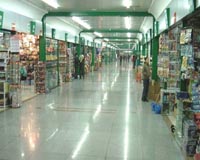| . |  |
. |
Hong Kong (AFP) April 20, 2010 Sushi lovers are running out of prized Norwegian salmon and planeloads of exports from garments to mobile phones are piling up as Asian business counts the cost of Europe's air chaos. Japanese carmaker Nissan said it was being forced to curtail some vehicle production owing to a shortage of parts from Ireland, with European air transport in turmoil owing to the volcanic eruption in Iceland. Thousands of factories in China's Guangdong province, the workshop of the world, have seen air shipments of watches, jewellery and high-end fashions delayed while stranded executives are kicking their heels in frustration. Bernard Pouliot, chairman of Hong Kong-listed financial services company Quam Ltd., is among the many Asia-based bosses stranded in Europe or unable to fly overseas to seal deals in person. Pouliot headed to Stockholm last week to attend a business conference, but got stranded with a colleague as he tried to connect through London -- while two other Quam employees are now stuck in the Swedish capital. "I never made it to Stockholm," Pouliot told AFP when reached on his mobile phone. "So myself and another colleague decided to meet with several financial services firms in London. What else can we do?" he said, adding that his London hotel has now jacked up his room rate by 25 percent. Piles of Europe-bound clothing are sitting in Bangladesh's main airport with about 350,000 kilograms (770,000 pounds) of the desperately impoverished country's key garment exports stuck in limbo. "The garments were already behind schedule, and now they are being held up because of the flight problems -- we are worried buyers will reject these shipments as they are so late," said Abdus Salam Murshedy, president of the Bangladesh Garments Manufacturers and Exporters Association. In South Korea, electronics giants Samsung and LG said they were unable to air-freight about 200,000 mobile handsets valued at 30 million dollars a day, or more than 20 percent of their total daily electronics exports. Losses for South Korean microchip exporters stand at about five billion won (4.5 million dollars) a day, while some 15,000 South Koreans including businessmen have cancelled trips to Europe, officials say. Premier hotels and restaurants in Hong Kong are staring at shortages of Belgian chocolates, Dutch fresh-cut flowers and French cheese, according to Dennis Yau, director-general of the Federation of Hong Kong Industries. He said thousands of factory suppliers in Guangdong, over the border from Hong Kong, were getting more alarmed the longer the disruption continues. "Fortunately the peak season for deliveries usually starts in May, but if this lasts beyond the end of this week, problems will arise," Yau said. Hong Kong's swanky Peninsula Hotel may soon have to yank German asparagus and lamb off its menu if air supplies do not resume, a spokeswoman said, while Japanese fish markets and sushi eateries are feeling the pinch too. "Absolutely nothing is coming our way. I'm praying that the disruption ends soon," said one seller in Tokyo's massive Tsukiji fish market who usually imports salmon from Norway. Only three ageing slices of the fish were displayed in his tiny store, and the seller said he would start receiving salmon from New Zealand on Friday, although the Norwegian variety is coveted above all. Some New Zealand firms say they are enjoying an unexpected windfall from the flight chaos as orders of chilled meat, flowers and fish from Asia and the Middle East surge. Organisers of a blue-riband banking conference in Singapore are striving to fill the slots of five speakers whose flights have been affected by the shutdown of European airspace. Among the speakers for The Asian Banker Summit 2010 was Asgeir Jonsson, chief economist of the Arion bank in Iceland, who was due to give a keynote presentation on Tuesday but may now have to speak via videoconference. "This kind of thing always gives a big boost to that (videoconferencing) business -- it did during SARS," Quam's Pouliot said, referring to a 2003 epidemic of the respiratory disease that paralysed Hong Kong. "But at the end of the day, people still want to meet face to face."
Share This Article With Planet Earth
Related Links Global Trade News
 EU chamber says China business climate worsening
EU chamber says China business climate worseningBeijing (AFP) April 20, 2010 Growing nationalism and lobbying by local firms is making China more protectionist and hostile towards foreign firms, European businesses claimed on Tuesday. Market-opening reforms had unmistakably slowed as Beijing gains more economic clout, Joerg Wuttke, president of the European Union Chamber of Commerce in China said, warning it could spark a backlash in Europe. "The pie is getting b ... read more |
|
| The content herein, unless otherwise known to be public domain, are Copyright 1995-2010 - SpaceDaily. AFP and UPI Wire Stories are copyright Agence France-Presse and United Press International. ESA Portal Reports are copyright European Space Agency. All NASA sourced material is public domain. Additional copyrights may apply in whole or part to other bona fide parties. Advertising does not imply endorsement,agreement or approval of any opinions, statements or information provided by SpaceDaily on any Web page published or hosted by SpaceDaily. Privacy Statement |